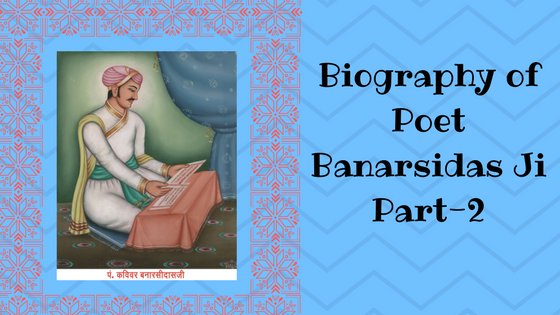“This article is originally written by Dr. Ranjana Jain, New Delhi. I have translated it into English.”
हिंदी में पढ़ने के लिए यहां क्लिक करें |
. . .
In the first part of this series, we got to know about the childhood of poet Banarsidas Ji. Let’s talk about his youth in his own words.
Entry into Adulthood:
When the poet entered adulthood, the rule of the Muslims was going on in the country. Distressed by their atrocities, the citizens used to marry their sons and daughters at a young age. The wedding of Banarasidas ji was also completed in 1654 in 11 years with the daughter of ‘Kalyanmal Ji’ resident Khairabad. With great revelry, Khargansen brought his daughter-in-law to the home. But look at the strangeness of deeds! On the day the daughter-in-law came home, Khadgasena’s daughter was born and the grandmother of Banarasidas Ji died. The description of this happiness and sadness in the words of the poet is as follows :
नानी-मरण, सुता-जनम,
पुत्रवधु-आगौन।
तीनों कारज एक दिन,
भये एक ही भौन।।
यह संसार-विडम्बना,
देख प्रगट दुःख-खेद।
चतुर-चित्त त्यागी भये,
मूढ न जाने भेद।।
After the marriage, the studies were almost over due to the responsibilities. In the meantime, Banarasidas ji did a small job of buying and selling sea shell due to economic-widespread wandering around the family. By this time, Banarsidas Ji was 14 years old. Due to being the only son, he was pampered by his parents.
As the young people are famous for their lust, the poet Banarasidas ji also remained untouched by this. The prestige, wealth and self-esteem of the family do not matter to lusty men and women. At this time, learning about science, parents and the elders proves meaningless. Banarasidas ji was so excited at this time that after leaving studies, he became addicted to the only psychic. He himself writes about him:
तजि कुल-कान लोक की लाज,
भयो बनारसि आसिखबाज।
Stealing jewellery, gems, and rupees from home, and spending on things by hiding from parents became his habit. This sequence was so long that in the meanwhile, the poet also made a verse-poetry containing ‘nawras'(nine emotions), especially about a thousand verses and cassettes. However, it constituted all emotions but attraction and lust were mainly seen in his poems.
It is said that if that composition was available today, then make up its place in the finest compositions of the make-up world.
Although Banarasidas Ji was very prudent, he used to also condemn this sexual tendency from time to time and also tried to get rid of it. But there was such a strong emergence of character-charming deeds that he lost his manhood in front of him. He himself writes:
पोथी एक बनाई नई,
मित हजार दोहा चौपाई।।
तामैं नवरस रचना लिखी,
पै विशेष वर्णन आसिखी।
ऐसे कुकवि बनारसि भये,
मिथ्या-ग्रंथ बनाये नये।।
कै पढ़ना कै आसिखी,
मगन दुहुँ रस माँहि।
खान-पान की सुध नहिं,
रोजगार कछु नाहिं।।
How long did it last? Peot writes in this regard:
ऐसी दसा बरस द्वै रही,
मात-पिता की सीख न गही।
करी आसिखी पाठ सब पढ़े,
संवत सोलह सौ उनसठे।।
In this way, after spending two years in the glare of material love, once he went to take his wife from in-laws home and stayed there for a month. While returning home, the poet has suffered lethal leprosy due to the rise of premeditated inauspicious deeds. The body of jolly hearted Banarsidas Ji was full of cravings of the disease which exploded in body-parts i.e. smelly-boiled. All relatives went away from him, only wife and mother-in-law took care of him. In the words of poet Banarsidas Ji:
भयौ बनारसिदास तन,
कुष्टरूप सर-संग।
हाड़-हाड़ उपजी विथा,
केस-रोम-भ्रुव- भंग।।
विस्फोटक अगनित भये,
हस्त-चरन चौरंग।
कोऊ नर साला-ससुर,
भोजन करहिं न संग।।
ऐसी अशुभ-दशा भई,
निकट न आवै कोई।
सासू और विवाहिता,
करहिं सेव तिय दोइ।।
जल-भोजन की लेहिं सुध,
देहिं आन मुख- माँहि।
ओखद° ल्यावहिं अंग में,
नाक मूँद उठ जाहिं।।
(Think of how intense and painful terrible situation would have been of the poet at that time.)
Many types of drugs were given to Banarsidas ji, but instead of being reduced to pain, they became unbearable. After a while, luckily he got a barber-doctor who healed him in six months. But while returning from the in-laws he came alone, the in-laws did not send the wife with them.
On returning home, he got engrossed in romance again. After about four months his wife came back to him, but there was no restriction on his lusty attitude.
Someone has said it rightly:
विसयासक्तचित्तानां,
गुणः को वा न नश्यति।
न वैदुष्यं न मानुष्यं,
नाभिजात्यं न सत्यवाक्।।
That is, all properties like scholarship, discrimination, and nobility of the lusty human being are destroyed.
Fortunately this year a daughter of Banarasidas ji was born. But within six-seven days, the girl died as well as Banarasidas Ji suffered from long-term fever. The doctor did not let him eat for twenty days. Due to starving, he ate half kilograms of bread when everyone slept. Coincidently, he became healthy too. He himself writes:
आध सेर की पूरी दोइ।
खाट हेट ले धरी दुराइ,
सो बनारसि भखी चुराइ।
वाही पथ सों नीकौ भयौ,
देख्यौ लोगनि कौतुक नयौ।
. . .
Superstitious:
The poet Banarasidas Ji was a terrible-blind believer. One day a monk said, “I have one mantra. After one year of his methodically chanting, a gold coin will be found at the door every day after one year.” Then, Banarasidas ji gave a lot of money and instantly took mantra and started chanting. He remained trapped in this delusion for a year. After one year when he got nothing, then he left food and water in repentance. (The poet has described this incident on his own)
It had not been many days since these incidents, he got trapped in a sadhu’s delusion. By offering temptations of immortality-free of liberation and giving some worship things and conch shells, that monk said, “This is the idol of Shiva, worshiping it, you will be liberated.”
Banarasidas Ji became emotional, lifted the statue and started worshiping the idol from Shiva by chanting mantra. If something went wrong someday, then he regretted and ate dry food the next day. He himself writes:
पूजैं तब भोजन करें,अनपूजैं पछिताइ।
तासु दण्ड अगले दिवस,रूखा-भोजन खाइ।।
He told this to no one in the house for a long time. The events filled with such superstition have been mentioned by the poet himself.
. . .
Wives and children:
Banarsidas Ji married three times. And together with the three wives, there were nine offsprings. But unfortunately, all three wives and all children received death in front of each other. Think about when the pain of the death of a child is unbearable, then we can’t even imagine the pain of losing nine children in front of his eyes. The poet himself writes:
तीन विवाहीं भारजा,सुता दोइ सुत सात।
नौ बालक हुये मुए,रहे नारि-नर दोइ।
ज्यों तरुवर पतझार ह्वै,रहें ठूँठ से होइ।।
Means I had nine children but none of them lived. Only we husband and wife left, just like the trees stand on the stump after their all the leaves fall in autumn.
But due to the destiny, the poet began to become aware of the world’s uncertainty before the death of the third wife. Many things like deaths and frustration of business that happened in his life mobilized him. Poet Banarsidas Ji who was indulged in lust for a long time turned to detachment.
One day the poet Banarasidas Ji was sitting along the Gomti river along with his friends. A book named ‘Navras’ filled with Shringar Ras(Emotion of Makeup) was in his hands. He was telling the verses to his friends. Suddenly, such a wave of spirituality came that it shattered the romantic and emotional-minded attitude. The poet was so much repentant on the fictitious poems that he floated the novel of ‘Navaras’ in the Gomti river with his own hands. Poet writes describing this:
एक दिवस मित्रह्न के साथ,
नौकृत पोथी लीन्ही हाथ।
नदी गोमती के बिच आइ,
पुल के ऊपर बैठे जाइ।।
वाचैं सब पोथी के बोल,
तब मन में ये उठी किलोल।
एक झूठ जो बोले कोइ,
नरक जाइ दुःख देखे सोइ।।
मैं तो कलपित-वचन अनेक,
कहैं झूठ सब, साँचु न एक।
कैसे बने हमारी बात,
भइ बुद्धि यह अकस्मात्।।
यह कहि देखन लागै नदी,
पोथी डार दइ ज्यों रदी।
The direction of the life of Banarsidas Ji turned from that day. A Jolly person became interested in spirituality than makeup.

